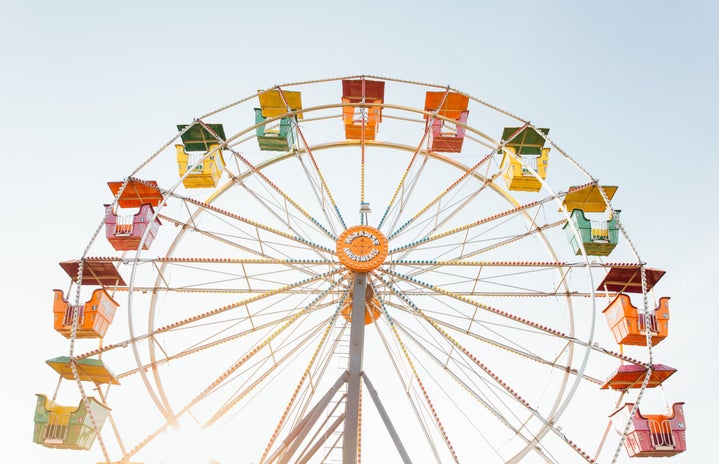Hopefully, the Thanksgiving Holiday gave you all some extra time to catch up on some well deserved sleep. That said, you might be quick to fall back into your sleep deprived study schedule upon your return to classes. It’s totally understandable. Sleep may not always be a priority for you but living in a state of constant sleep deprivation can make it difficult to be a smart and efficient leaner, especially during midterm season.
Here are some tips to help you fall asleep and wake up feeling more rested.
1. Take Melatonin To Reset Your Sleep Cycle
Melatonin is naturally produced within the body to control your internal clock for sleep. The levels of melatonin in your body become higher in the late evening, which consequently makes you more tired. In the morning, the opposite happens; your body lowers melatonin levels so that you can properly wake up.
As it is naturally produced within the body, it’s safe to take as a supplement to remedy issues like insomnia. The suggested time to take melatonin is a few hours before bedtime, in the evening when your body is getting into the phase when it is producing more of it. It does not actually induce sleep, so taking it right before bed isn’t as effective.
It can be used to help you sleep, reset your sleep cycle and get back to a proper sleep routine.
2. Listen To Pink, Brown, or White Noise
These three types of noise can be used to mask sounds that may wake you up during the night, and also to create a more relaxing atmosphere.
White noise sounds like static, while pink noise is deeper and more balanced – sounding similar to rain, while brown noise is even deeper. All three noises can remedy sleep issues and have been shown to improve sleep quality. It’s all a matter of preference as to which you think sounds best.
3. Turn Off All Screens & Lights 30 Minutes Before Bed
Our bodies regulate our sleep cycles by sensing light and darkness. When there’s light, our body lowers our melatonin levels to signal us to stay awake. When it’s dark, our body raises our melatonin, signalling us to go to sleep.
The light from laptop screens and iPads do the same thing, meaning that they may be the issue leading to our sleep deprivation.
4. Exercise!
Don’t live a sedentary life – exercise can and will make you tired so long as it’s not too close to when you plan on going to sleep. If you exercise too close to bed time, of course you will be more awake than before, but exercising in the morning or afternoon can have beneficial effects on your sleep. The main benefit being its positive effect on your sleep quality and its help in making you fall asleep more quickly. The reason for this being that exercise heats you up, and it also cools you down in the post-exercise phase. Similarly, the brain triggers a similar cool down to prepare us for sleep. Not to mention, the general output of energy from daily exercising also makes one very tired by the time it’s night time.
5. Intake Herbal Tea
Many teas out on the market can help you sleep. While chamomile can help with relaxation, the two better ingredients more scientifically proven to help with sleep are valerian root and passionflower. Valerian root is said to have some mild sedative qualities, and sleep quality is improved by taking either valeria root or passionflower in small doses. Sleep quality is proven to be better with the latter two herbs in comparison to a placebo, which means they have truthful properties for relaxation.
6. Eat Potassium & Magnesium Rich Foods
Both magnesium and potassium serve as natural muscle relaxants. Bananas are a fruit that is rich in both minerals. By changing your diet and eating lifestyle, you are guaranteed to have a better sleep.
7. Take A Hot Bath
Taking a hot or warm bath before bed can mimic the effect that exercise has on you with a heating-cooling effect. Immediately after you’re finished your bath, you will cool down which will promote sleep. Consequently, you’ll have an easier time falling asleep. Your brain activates a cool down of the body to prepare for sleep, which is similar to what the hot bath does for you. A hot bath can have a relaxing effect as well as help with any tense muscles you may have.
8. Stop Taking Naps
If you tend to have naps in the afternoon, they can cause you problems getting to sleep at night. It’s better to avoid them or shorten them to less than thirty minutes. Naps can change your sleep schedule in unpleasant ways, so try to avoid them as much as possible.
9. Create A Sleep Routine
This one can be a difficult one to do, especially because of how much University related work we have to cover under short time spans. But ideally, having a routine of when you go to sleep and when you get up helps create an internal sleep-wake cycle that your body can get used to. Once it becomes routine, then it’ll become progressively easier to do.
10. If Not Sleepy, Stay Productive
It is recommended that if you can’t fall asleep within 30 minutes, then you should pick up something else to do to get your mind tired, and something that does not involve electronics. Reading is a good way to get your mind tired again. Once you start getting tired, you should put away the book and try falling asleep again should be your next course of action.
References
1. https://sleepfoundation.org/insomnia/content/what-do-when-you-cant-sleep
2. http://www.huffingtonpost.com/2014/12/23/reading-before-bed_n_6372828.html
3. http://www.huffingtonpost.com/2014/12/23/reading-before-bed_n_6372828.html
4. http://www.webmd.com/sleep-disorders/ss/slideshow-sleep-disorders-overview
5. http://www.webmd.com/sleep-disorders/ss/slideshow-sleep-disorders-overview
6. https://sleepfoundation.org/ask-the-expert/how-does-exercise-help-those-…
7. https://sleepfoundation.org/ask-the-expert/how-does-exercise-help-those-…
8. http://www.huffingtonpost.com/2015/09/27/natural-sleep-aids_n_3882229.html
9. http://www.slate.com/blogs/the_drift/2015/11/30/does_sleepytime_tea_actu…
10. https://www.caring.com/articles/five-foods-that-help-you-sleep
Photo References
1. http://il9.picdn.net/shutterstock/videos/4249871/thumb/1.jpg
2. http://www.consumerreports.org/content/dam/cro/news_articles/Electronics…
3. http://videos2.healthination.com/HN_BB_Sneak_in_Exercise_12_11_12_v2/HN_…
4. http://realitysandwich.com/wp-content/uploads/2015/02/Venus-Factor-Revie…
5. https://authoritynutrition.com/wp-content/uploads/2014/10/bananas-on-a-w…
6. http://www.thefacebeauty.co.uk/blog/wp-content/uploads/2012/09/hot-baths…
7. http://www.hotel-r.net/im/hotel/dk/relax-and-sleep-5.jpg
8. http://www.michelleferreri.com/wp-content/uploads/2015/09/smallbanner.jpg
9. https://a.dilcdn.com/bl/wp-content/uploads/sites/8/2012/10/no-naps.jpg
10. http://www.generationy.com/wp-content/uploads/2014/07/why-routine-is-imp…
11. http://www.howto-simplify.com/wp-content/uploads/2015/11/reading-in-bed.jpg


